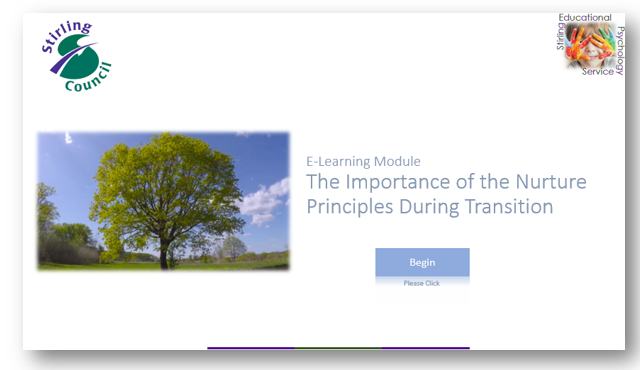This page provide updates in relation to developments within nurture. This page will be regularly updated so please scroll down to see all the information.
Nurture Ambassador Workshops 2022
Full
This year we are continuing to implement a Nurture Ambassadors model to ensure a consistent ethos and culture by providing a framework in relation to promoting children and young people’s wellbeing, resilience, attainment and achievement. The aim of this framework is to promote readiness, ownership and commitment of our establishments and also develop robust evaluation and sustainability. Once identified by the establishment Senior Management Team, the Ambassadors (two staff members) will take on a lead role to coordinate the implementation of nurture within their establishment. To do so they will attend the Nurture Ambassador Workshops to build on their knowledge of child development, attachment and nurture but also to support them to plan the implementation in their establishment. This role will require time and commitment to ensure the tasks can be completed appropriately.
The Nurture ambassador workshops are full for the current session. for more information and future sessions contact your link educational psychologist.
E-Module: The Importance of the Nurture Principles During Transition

We are pleased to share our new e-learning module exploring the importance of applying the nurture principles during points of transition. It is an interactive learning experience that is made up of three main content areas and finishes with a questionnaire. It should take no longer than 60 minutes. The three key areas are:
-
-
-
- The Impact of Transition
- How to Support Children and Young People During Transition
- How to Look After Ourselves During Transition (staff wellbeing)
-
-
Due to the current context, this e-module has been adapted for all staff to provide information and ideas of how applying the nurture principles can support transition, particularly following extended absence.
The e-module is located here on our e-learning page within this blog, however, it is password protected. To access this please contact your link Educational Psychologist or email us here :
Nurturing Approaches in Stirling
There are three emerging themes outlined in Stirling’s Children’s Service Plan (2017-2020):
- Improving children and young people’s mental health and wellbeing
- Improving life outcomes for looked after children and young people
- Tackling the impact of low income on children and young people’s participation and achievement
Stirling Educational Psychology Service has developed an authority wide strategy for nurturing approaches, which contribute to these themes by providing a framework for promoting children and young people’s wellbeing, resilience, attainment and achievement. The strategy is for:
- Stirling’s children and young people and their families
- Staff within Stirling’s educational establishments
- Staff within the wider Children’s Services, for example, social workers and staff in our local residential unit
In response to the national priorities of raising attainment and closing the poverty related attainment gap, Stirling Council’s strategy for whole school nurturing approaches has at its core a universal approach to promoting inclusive practice in all early years settings and primary and secondary schools leading to improved positive behaviours and positive relationships.
The strategy provides guidance to staff within Children’s Service on what is meant by nurturing approaches, how best to implement nurturing approaches and how to effectively evaluate the impact of these approaches on children and young people.There has been an increased focus on developing whole school nurturing approaches across Scottish authorities with the aim of supporting a wider range of children and young people and in sharing universal values and a common understanding of the nurture principles.
Our definition of nurturing approaches is based on Education Scotland’s national definition:
A nurturing approach recognises that positive relationships are central to both learning & wellbeing. A key aspect of a nurturing approach is an understanding of attachment theory and how a child’s early experiences can have a significant impact on their development. It recognises that ALL school staff (and partners) have a role to play in establishing the positive relationships that are required to promote healthy social and emotional development and that these relationships should be reliable, predictable and consistent where possible. A nurturing approach has a key focus on the school environment and incorporates attunement, warmth and connection alongside structure, high expectations and a focus on achievement and attainment.
and is based on the understanding of the 6 nurturing principles:
- Children’s learning is understood developmentally
- Environment offers a safe base
- Nurture is important for the development of wellbeing
- Language is a vital means of communication
- All behaviour is communication
- Transitions are significant in the lives of children and young people




